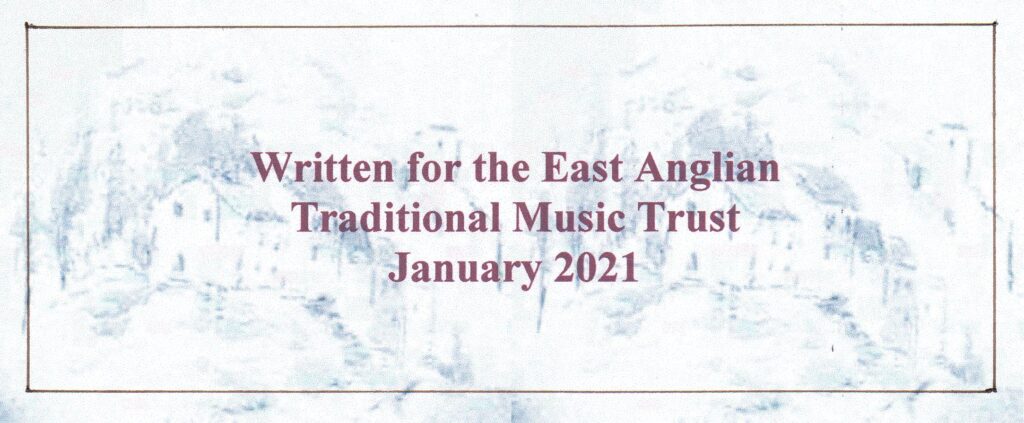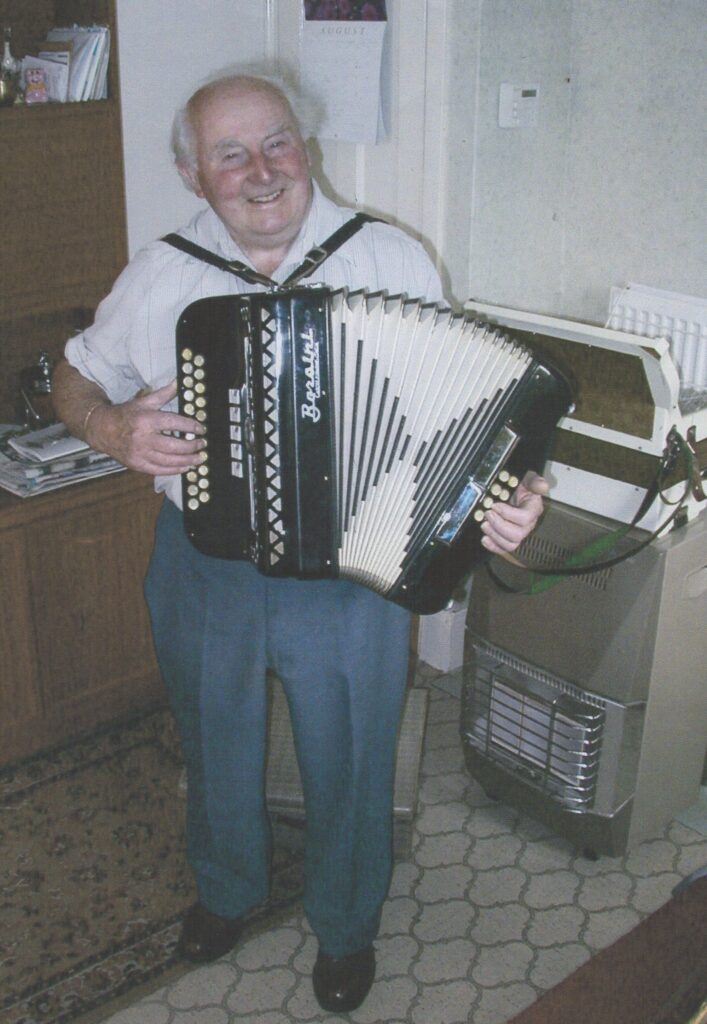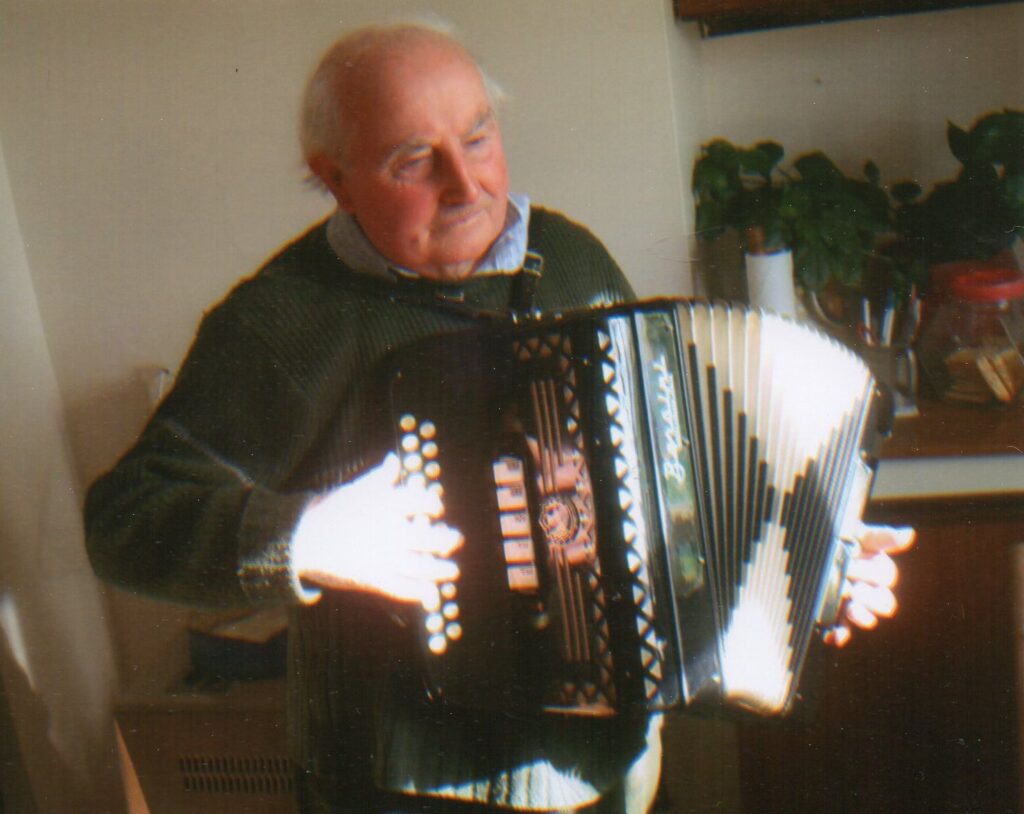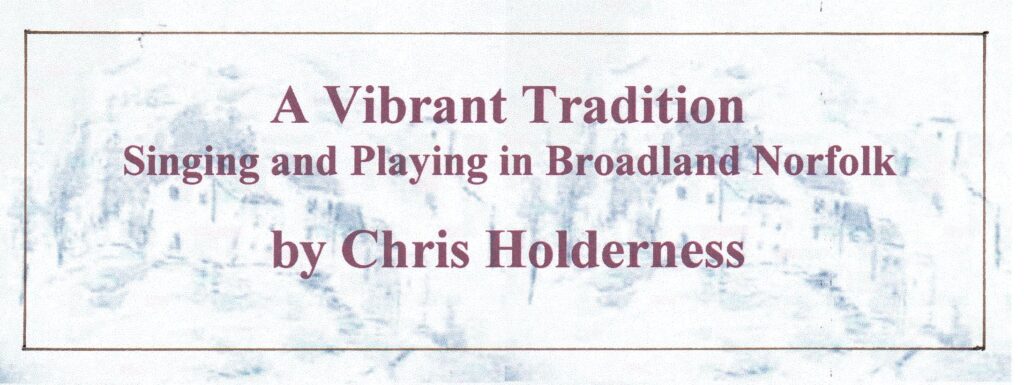
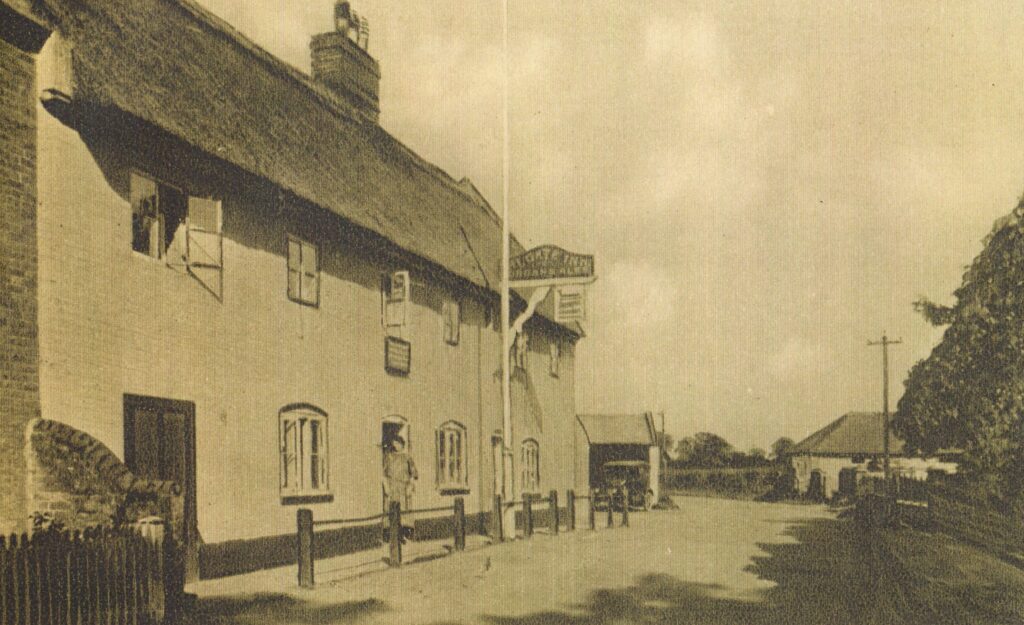
Postcard from the Rig-a-Jig-Jig collection
The east coast of Norfolk, roughly the area of the Broads, was a fertile area for traditional music and song, in a county which was renowned for such music making, as was East Anglia in general. The tradition does continue to this day, albeit hanging by a fairly slender thread perhaps. A couple of singers became well-known and influential in their older years: Harry Cox from Catfield (1) and Sam Larner from Winterton (2), the latter coming into the public eye when BBC radio producer Philip Donnellan found him by chance in The Fisherman’s Return pub in the village. These two singers were not the only exponents of the tradition, by a long way however; both were part of a community of singers, players and step dancers which was vibrant until such music making largely died out eventually.
Harry Cox particularly was surrounded by older men who sang, and to a lesser extent, played, in various pubs around the area. His brother Fred was an accomplished musician and singer, for example. (3) There were many others.
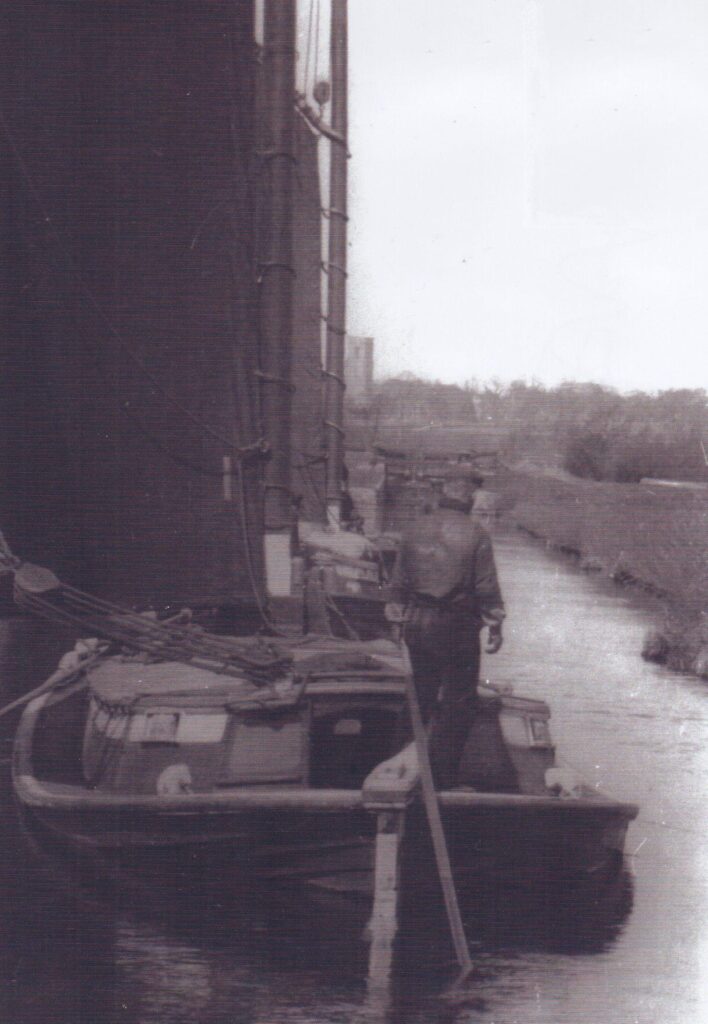
Credit: Norfolk Wherry Trust
One of these was Walter Gedge, born in Honing in 1899. He became a wherryman, but unfortunately research has turned up little else about him. He was recorded by Tony Singleton in the early 1970s and proved to be a vibrant singer with an evident sense of humour. These were released on the CD Father went to Yarmouth (4). The songs he was recorded singing were Father went to Yarmouth, Sweet and Delightful, Poor Smuggler’s Boy, Dark Eyed Sailor, The Country I’m Leaving Behind, The Scarlet and the Blue, Barbara Allen, Banks of Sweet Dundee and The Drunkard’s Daughter. He was a regular singer in many pubs, such as the Gardener’s Arms in Honing and the Half Moon and Swan Inn in Horning and the New Inn in Worstead. (5). The Gedge family also had a farm at Four Crossways in Honing, as well as being wherrymen.
Another singer recorded by Tony Singleton at the same time was Alfred ‘Mate’ Nudd of Hickling. Born in 1894, Nudd was a marshman until he went blind. He lived in a hut on Hill Common in Hickling and sang in the Pleasure Boat and the Greyhound in the village. Of Tony Singleton’s recordings, again released on Father went to Yarmouth, he sang Farmer’s Boy, Barley Mow, Ground on the Floor and the Blackbird.
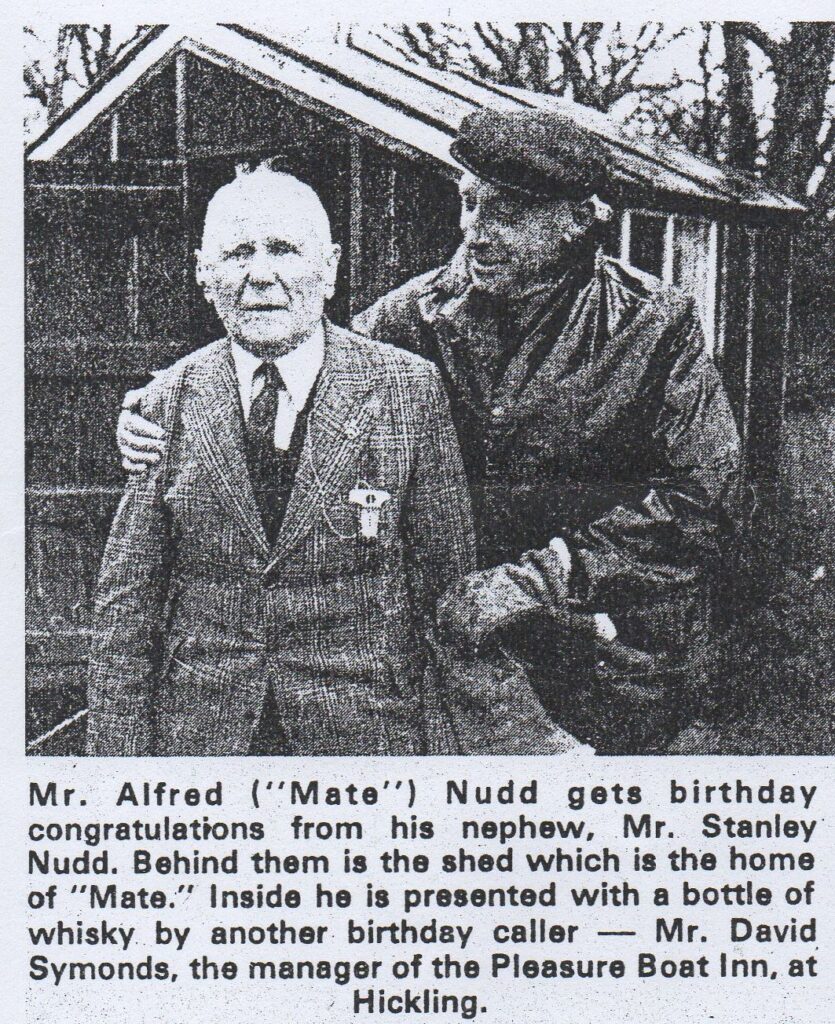
Credit: Eastern Daily Press via Chris Heppa
Although blind, he had no trouble recognising people by their voices and was able to get across the boardwalk to his hut. A newspaper cutting recalls that “Alfred Nudd popped out from the hut that has been his home for 40 years yesterday to be presented with a bottle of whisky to celebrate his 86th birthday from regulars at the Pleasure Boat Inn, Hickling.
“Mr Nudd, known as ‘Mate’ to his friends lives in the hut nearby on the edge of Hickling Broad, and for the last 25 years he has been blind. He has been visiting the inn for 75 years, and he was also presented with a radio and birthday cake. Attempts have been made to find him alternative accommodation, but Mr Nudd refuses to move and is snug in his shed, measuring 8 ft by 6 ft, which is heated by a coal stove…He has lived his life at Hickling apart from the years he spent in the Royal Fusiliers in the First World War.” (The cutting is from 1981 or 1982).
Another cutting, from the same year(s) as above, mentions: “But in these wintry days of sub-zero temperatures and crackling frosts, the fact that an octogenarian can survive cheerfully is remarkable in itself. And meeting 87-year old bachelor Mr Nudd, who is blind and almost deaf, makes it even more so.”
Refusing any attempt to be put in an old peoples’ home, he reflected “that he did not find his small abode cramped. ‘If it was too big, I shouldn’t find my way about’ he said philosophically.” (6) Clearly a man who was determined to hang onto his independence, despite his disability, he passed away in 1985, aged ninety.
There was certainly much step dancing in the area. This short extract is from Broadland Sport, by Nicholas Everitt, 1902, in which he mentions an unusual accompaniment to step dancing in Horning Ferry Inn: “Visiting first the low-roofed kitchen, we watched for upwards of half an hour the many and varied step dances of the Horning rustics. An American hand organ provided the music and a liberal supply of nutty brown old ale, with a dash of gin in it, promoted the energy of the dancers to an extent amazing to onlookers. At first glance the dancing appeared to consist of nothing but a great rattling of feet upon the well-sanded brick floor, with much stamping and occasional exclamations and gesticulations to vary the monotony, but the more careful observer would note that regular steps were made and that the dance in progress was one which required both practice and skill to perform.” A barrel organ would be an unusual instrument indeed to accompany step dancing. Mr Everitt may have been referring to a melodeon instead.
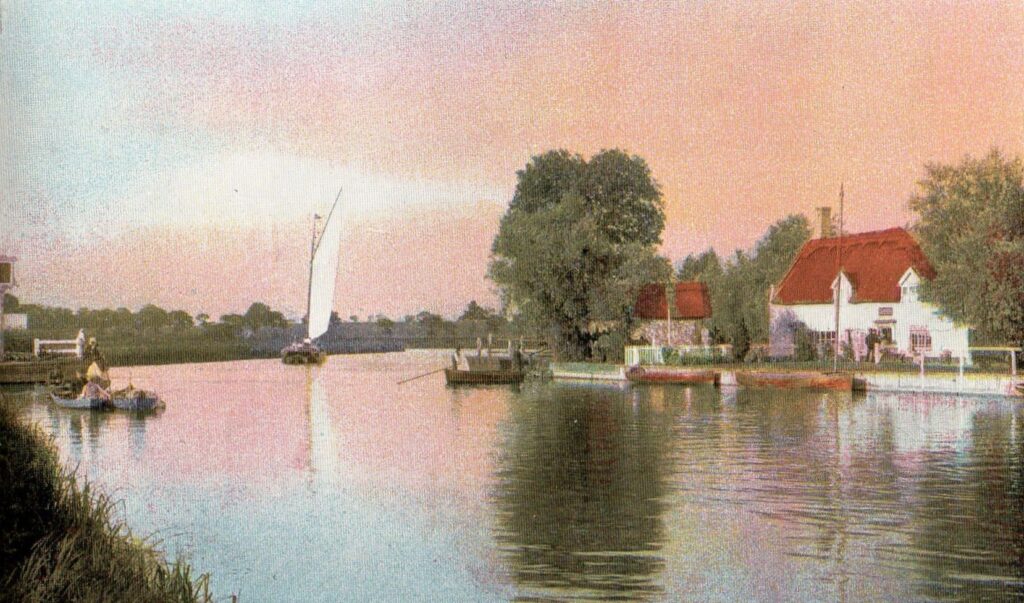
Credit: Pictures in Colour of the Norfolk Broads, Jarrolds, Norwich. c1905
Stuart Bush of Dereham, the grandson of dulcimer player John Bush of Hoveton, related that there was plenty of music playing in Neatishead Eagle: ‘Moco’ Miller step danced and played mouth organ at the same time. Two brothers also performed: Jakie Watt played mouth organ and George Watt the melodeon. They both step danced as well. Apparently they were known collectively as the ‘Ogle’ Watts. (7)
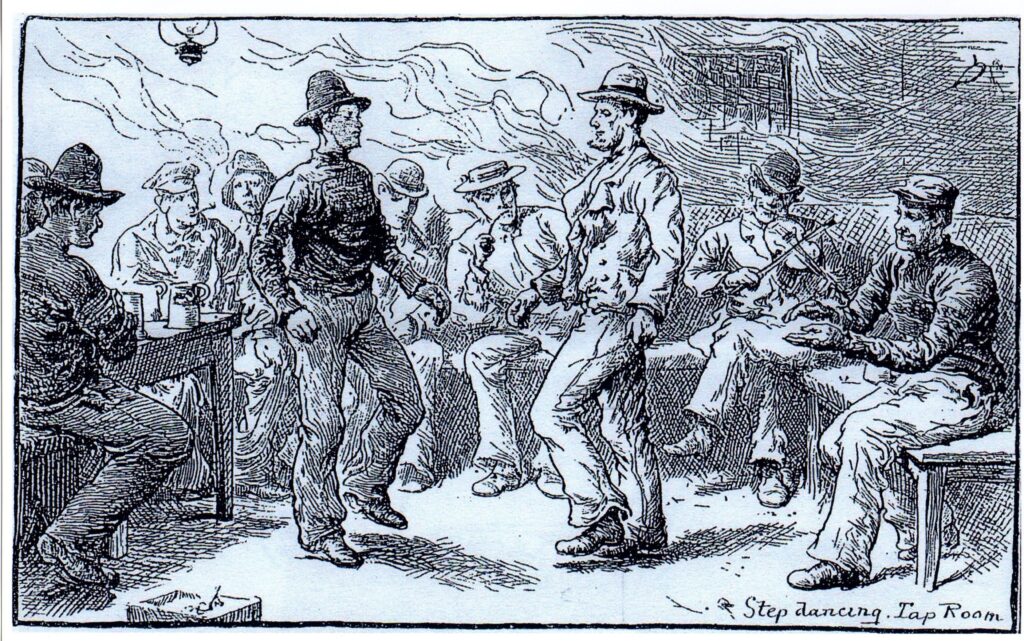
Credit: Graphic Magazine, 1887
Earlier in time, there was step dancing in Hoveton King’s Head. James Jimpson (1818-1899), the landlord, would play the fiddle for the dancing. He was landlord of the pub From 1865 until 1892. “After dinner we went into the tap-room to have a look at the step-dancing, which the Skipper knew of old, but the Boy had never seen. The North-folk (sic) men are great at step-dancing. It is curious to note the impassiveness of the faces and the utter stolidity of the upper part of the body and arms, and contrast them with the marvellously rapid patter and stamp of the feet on the floor. The Skipper has frequently seen a deputation sent to the bar to the governor, Jimpson, asking him to bring his fiddle – a boon which is seldom refused; and off they go, with a great consumption of beer in earthenware jugs.” (8)
Peter Colk, of Dilham, recalled the music making his father Henry was involved in (9): “He worked for the Great Yarmouth River Board, before the Water Authority came along. He used to work for them and he used to take an accordion (10) with him everywhere he went. My sister-in-law has still got a photograph of him playing outside a pub: Geldeston Locks. An old lady called Susan from the 1950s used to run that pub and her only helper was a goose, which used to alert her to anybody coming and whatnot. ‘Cause it’s quite a remote place for a woman on her own.(Her real name was Dorothy Ellis and she ran the pub from the 1950s until 1973.) And he often used to put up there on behalf of the Great Yarmouth Port and Haven Commission, and my sister-in-law has got several photographs of him playing outside in the sun.
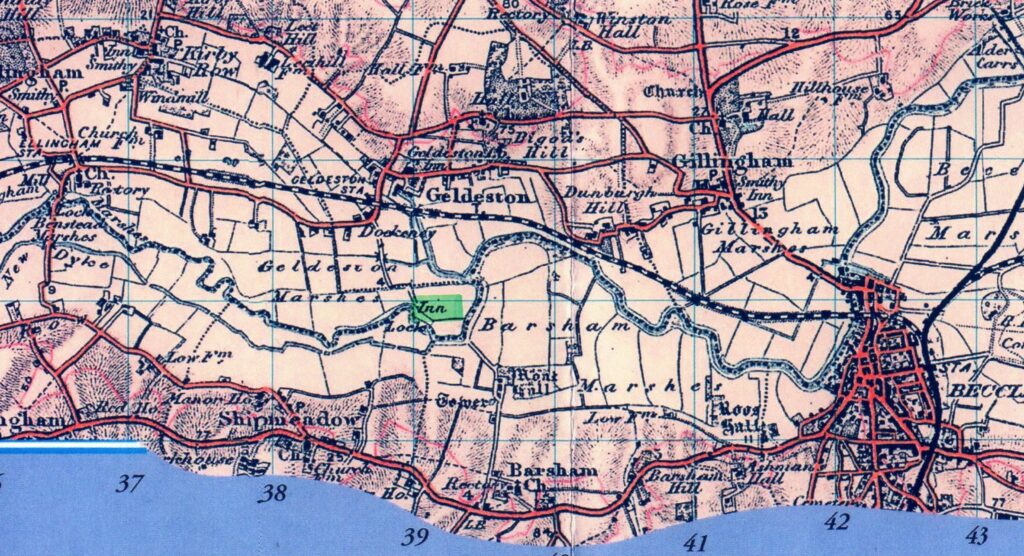
Copyright Cassini Publishing Ltd https://www.francisfrith.com/
products/historic-sheet-map?thing_norwich-the-broads_978-1-84736-323-7 Used by kind permission
“l think there were a few (musicians in Stalham) because, as I say, my father bought this accordion. I learnt to play it because I’d stand between his knees and he’d put his hands around me, as a toddler, with his hands on the notes. What’s the old hymn? Now The Day Is Over; that’s the first thing I learnt to play. And mother could play. My father had two particularly fond tunes. He was gassed very heavily at Mons in the First World War, although at seventy he could run me down the road and catch me. Roses of Picardy was one of his favourites, although it was written after the First World War. And the other one was the Irish-Australian Wild Colonial Boy.
He was very fond of that.
“He used to sing, but not (whilst) playing the accordion. He’d always get up and sing. He’d give you a song. I know one of them used to amuse us very highly, because it was Oh my, don’t be shy, without your blooming trousers. I can hear him singing that now. My father used to step dance. He only had to hear a tune, a bit lively tune, and he’d be step dancing. He used to think that modern dancing, Victor Sylvester stuff; he used to think that was utter nonsense. His only idea of dancing was either step dancing or the way the French did, where you just wrapped your arms around each other and twizzled. Usually it would be the White Horse or possibly the Eagle in Neatishead. The Eagle, they always had an accordion in the pub, and they kept it in good condition.”
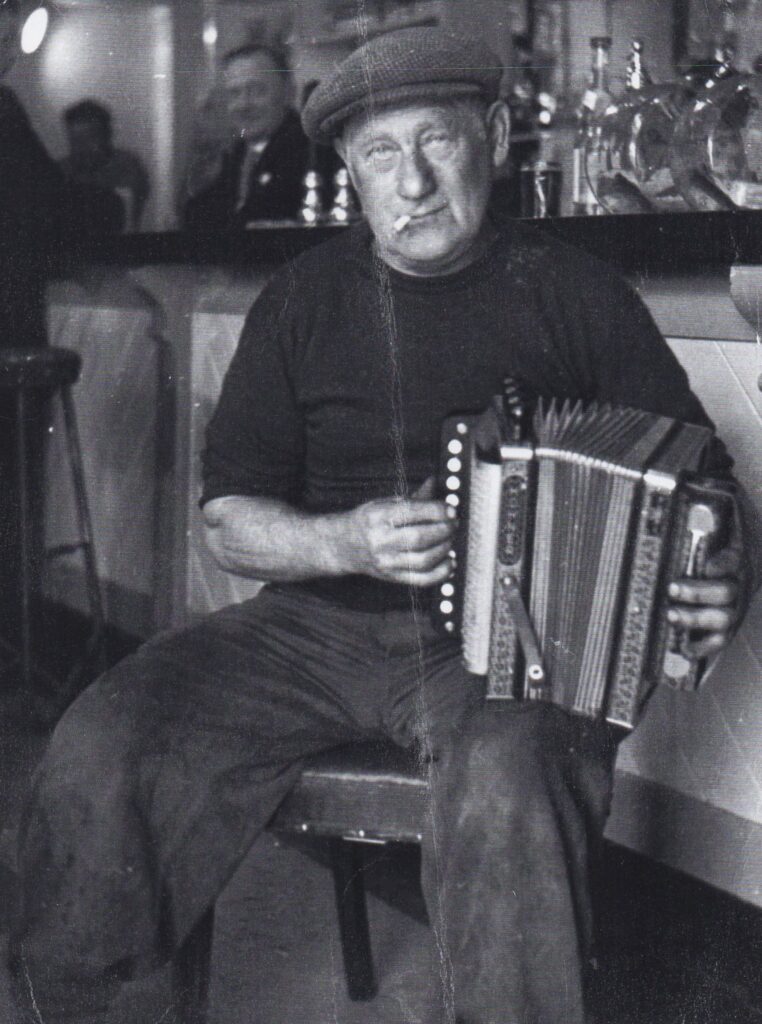
Credit: Peter Colk
When asked if Henry played for step dancing, Peter Colk replied, “Oh yeah, often; catchy little tunes.” Peter played Yarmouth Hornpipe. “Well, that came from my father. My father had these in his head. I suppose the last person I saw step dance was my father, I would have thought. There was a man who lived here; opposite the pub there used to be a blacksmith’s shop there; he was also a plumber and he played the melodeon. And he used to walk across the road to Smallburgh Crown pub nearly every night, and he’d have a tune on the melodeon nearly every night. Step dancing would go on there.’
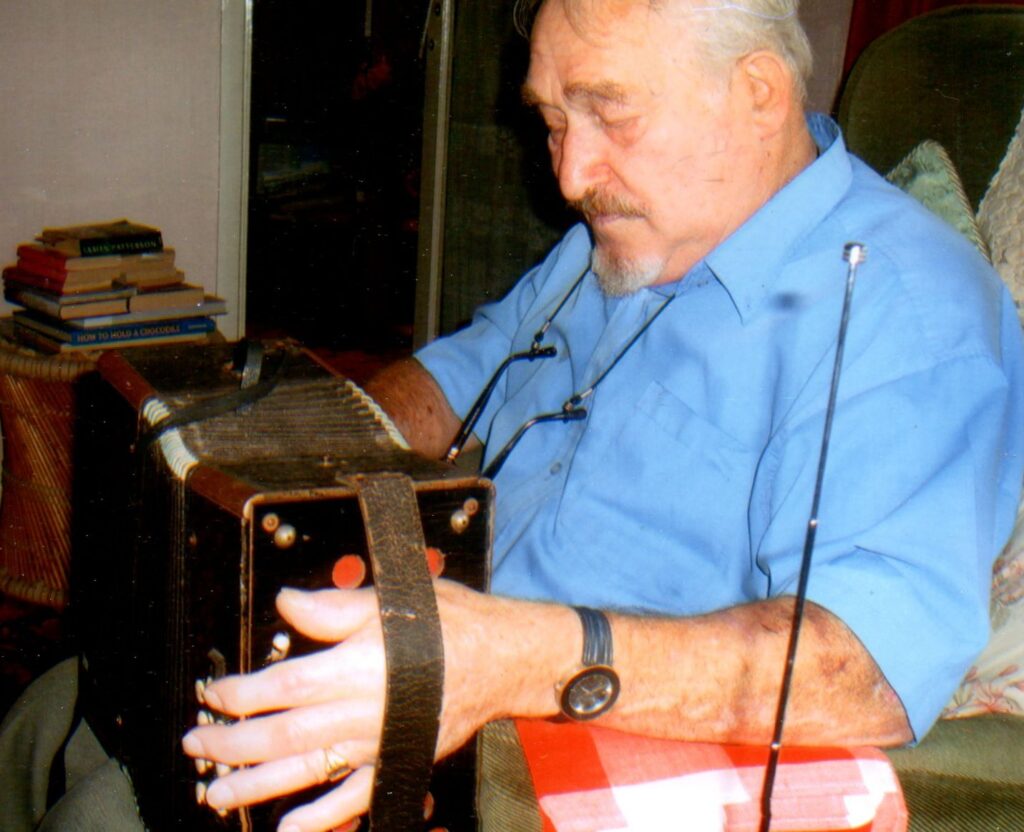
Credit: Des Miller & Chris Holderness, from the Rig-a-Jig-Jig collection
When asked about Harry Cox, Peter Colk mentioned: “There never was a pub in Barton Turf, but there was what they called the ‘Hole in the Wall’. The last house on the left, as you go into the staithe, before you come to the water; (they) had an arrangement with the brewery at Yarmouth, Lacons, whose emblem was a canary. You went in the back gates and he served you through a hatch in the wall, and all his beer stood in barrels above ground but like on a cold floor and in racks. It was all straight from the barrel, but the beer used to be beautifully kept. He (Harry Cox) used to sing outside. There’s a big chestnut tree, there were rough seats, and most of the men in the village – if they hadn’t got transport, because the nearest pub was the White Horse in Neatishead, or a bit further afield the Eagle in Neatishead – they used to sit around there and drink at night down there, and have a sing-song as well.” (The ‘Hole in the Wall’ was also known as the ‘Eel’s Foot’ and closed in 1966.)
Another singer, musician and step dancer was John Woodrow (1893-1968), who was a Romany who lived in Ingham. He played both one-row melodeon and mouth organ and was greatly in demand for step dancing, as well as doing so himself. He also appears on the Father Went To Yarmouth CD with recordings made by Tony Singleton, also by his friend and neighbour Sidney Sandell, who sings on the recording as well. Sidney Sandell was not a singer in public, but sang at home. Released on the CD are the songs, Old Woman From Hethersett (a version of Marrowbones) and The Egg Song. John Woodrow was certainly a regular pub performer and on the CD he plays Yarmouth Hornpipe, The Prisoner’s Song and Grandfather’s Clock.
Leslie Lawson, from Walcott, sang and played mouth organ around the area. He was recorded by Neil Lanham and fragments of the song Happisburgh Light and Yarmouth Hornpipe were included on the CD Songs and Stories from East Coast Fishermen. (11) Neil Lanham recalls that he had a version of Pleasant and Delightful and described him thus: “l do recall that he was not off the land and a bit more articulate than most of the ‘old boys’.” (12) Leslie Lawson was also included on the BBC radio programme ‘As I Roved Out’, broadcast on Sunday mornings and hosted by Peter Kennedy. The broadcast was on 02.01.1955 and Lawson sang The Farmer’s Curst Wife and The Dolphin, the latter being only an excerpt. (13)
Herbert Warnes at home
Credit: Des Miller & Chris Holderness from the Rig-a-Jig-Jig collection
Another musician from the area was Herbert Warnes of Sutton (14), who certainly came from a musical family. “l used to play the little old button key one when I was a little boy. My family all had them. My father and all his brothers. Yeah, we all used to (play music). My brother’s mouth organ. Mind you, we don’t know (sheet) music. I don’t know a note. You see, the trouble is, I can’t play really too good in front of people. Years ago, we used to go to the pub. If I’d had plenty of beer, I was away; but I had an uncle like that. He used to go down the pub, but he’d always have two or three pints of beer before he could play. (His name was) Herbert Warnes, same as me! Only, he weighed about twenty stone. He was about five times bigger than me.
“Actually my father taught me. He used to have the little old button (melodeon). They were made in Saxony. That had four stops and ten buttons. My father, he was an old fisherman; old seaman and that. And he probably used to go away for three months. He would fish a lot in Scotland when I was a little boy. Well, he used to come home; we used to get down, I was about three or four when I started. He used to sort of gradually get me into it. That’s always there, isn’t it? If that’s in the family. That’s the same with my wife’s family. Her grandfather, he used to play; and one of her uncles taught my wife to play this (the melodeon). She could pick this up and play it. But that’s something in you. You can’t tell people. I mean, like tunes; I don’t plan to play a tune. That’s just the first one come into my head.
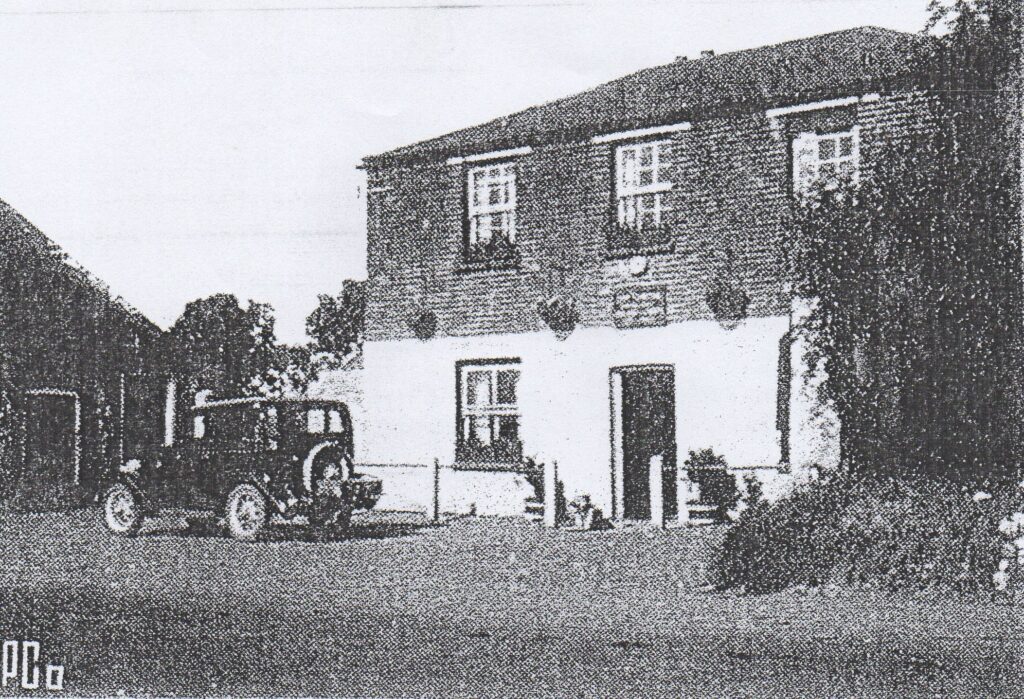
Credit Norfolk Pubs
“We used to go round these different pubs, just local pubs. There used to be one up the street, the Windmill. There was a chap kept that, Bill Kay (Alfred William Kay, landlord from 1953 until 1956), while we used to go down there. I mean, we’d be in there until two or three in the morning sometimes. That was just after the war years. I have played in the pub: the Sutton Wheel, the Windmill, the Harnser. We used to have a good old tune up Stalham Harnser, on the corner. Mind you, that was about fifty years ago.
“My father used to laugh and tell when he was a little boy they lived in a big farmhouse and his father and his father’s mates, they used to come round on a Saturday night, in a big old kitchen with pamment floors. They used to put an old wood door down. And probably one or two would play accordions and one or two play fiddles and that. They used to step dance on the old door. And he said my old mother (sic – grandmother?) used to sit up the corner, sewing with a candle! He said there was all that blooming racket. They just used to ignore her. He said they had two or three gallons of beer. That used to be in the family years ago, but no-one seemed to bother now.
“My grandfather used to play a fiddle. His father did, and some of his uncles did. He had one of them, used to play a little concertina, and he was pretty good. (My grandfather was) Jack Warnes. (My father was) Bob Warnes; Robert Warnes. He used to play an accordion. My uncle Jack, he used to live at Hickling; he used to play an accordion, but he played mandolin and all. My father used to say Jack spoil an accordion, ’cause he was a fairly big strong chap. He more or less knocked hell out of the accordion!”.
Herbert’s wife’s family were musical. “All on her mother’s side were. Her old grandfather used to play a tin whistle. They called him ‘Whistler’ (Harmer). A long brass tin whistle. He had (an) old dulcimer. Used to take that down the pub. He wasn’t taught. He used to play in Ingham Swan. One yarn he told me, when he was a young chap he used to go poaching; an old poacher. And he had this little button-keyed accordion and if you pull the four studs out, he say ‘l used to go down to the pub and had cotton wool all in my pockets. Used to down the pub and have a tune-up.’ When he was coming back he used to find out where pheasants’ and partridges’ nests were then. He used to put the cotton wool in the accordion and put the eggs all in there.
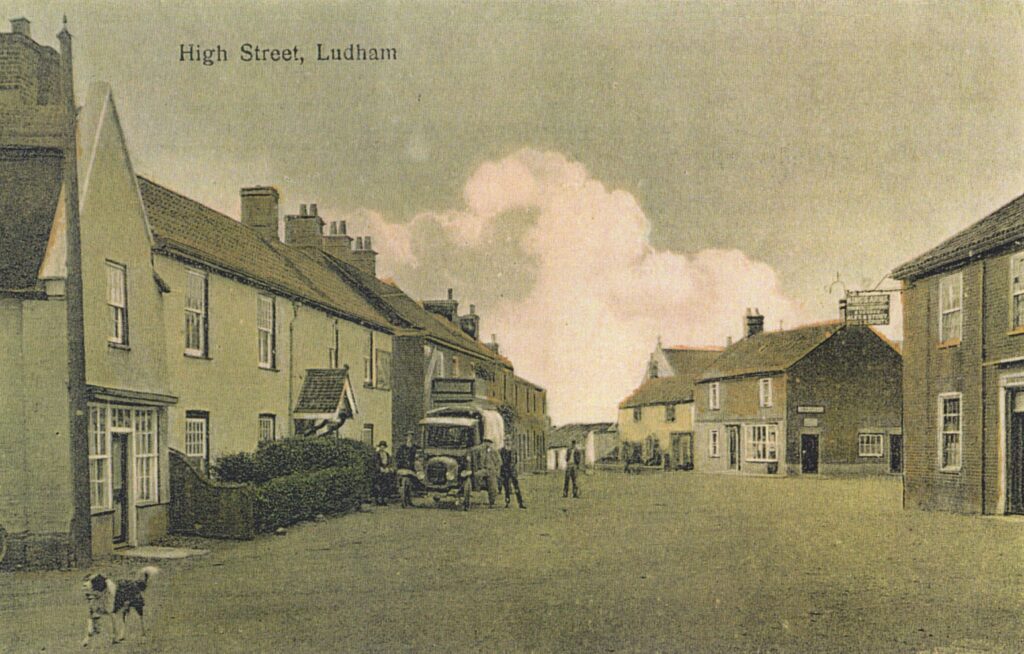
Credit: Rig-a Jig-Jig collection
“l can remember going into Horning Half Moon one night, one Sunday night, and that was then about twelve o’clock and there was four or five of us I know, a gang, drinking. We said to the landlord, ‘Police?’ ‘No’ he said, ‘That’s all right. That’s chaps from Ludham.’ And they said, ‘Let us in! You’ve got someone in there’. He said, ‘No, that in’t’. They said, ‘We know you have!’ So then they heard, ‘All right!’ So they came in. That was three or four chaps from Ludham. I mean, we were there until about three o’clock in the morning. And they had a go at singing songs, and if you’d sing a song and the others didn’t know it, someone else would have to buy the beer. Buy you a pint. And I remember singing that song On The Banks of The Clyde; I knew they wouldn’t know that. And they didn’t. Then we had to get up at six o’clock in the morning; about a couple of hours sleep – but nobody seemed bothered – and go a-sugar beet hoein’.”
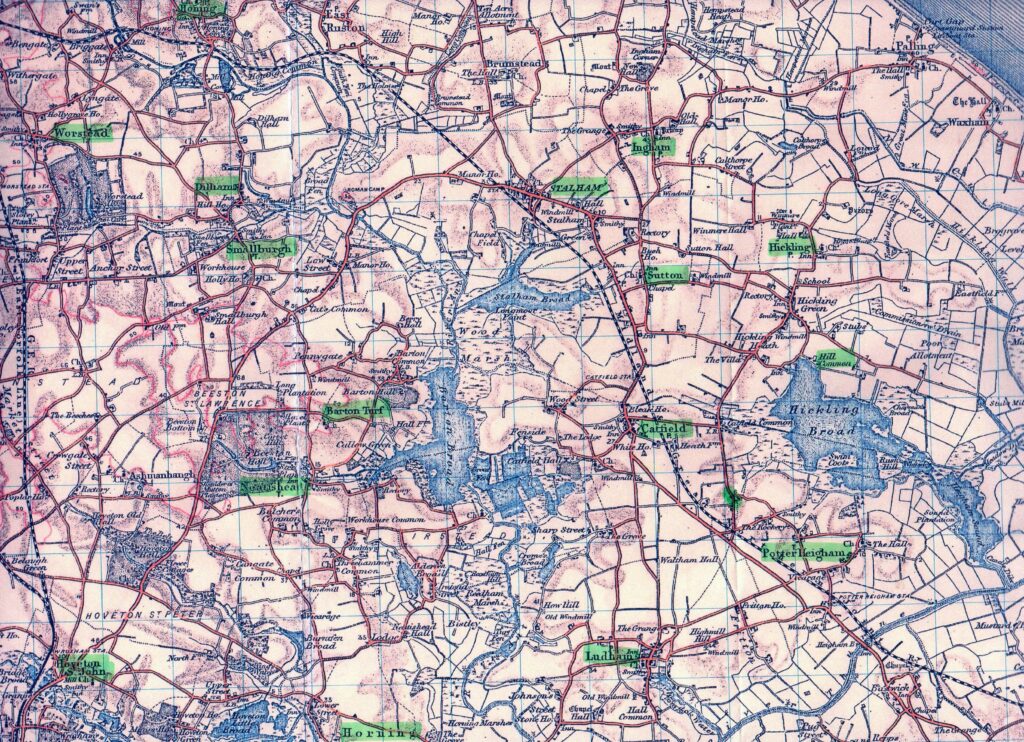
products/historic-sheet-map?thing_norwich-the-broads_978-1-84736-323-7 Used by kind permission
Most of the places / pubs mentioned in the article are indicated in green. Harry Cox’s cottage Sunnyside is the small mark between Potter Heigham and Catfield
This Broadland area of Norfolk was a fertile one for traditional music making, both in pubs and people’s homes. In true traditional fashion, the younger generation would learn both songs and tunes from parents, other family members and from others in their community, something that continued for decades before largely dying out with the advent of juke boxes in pubs and more modern music through media such as the radio. Sadly a vibrant tradition all but vanished.
Notes:
1) For information about Harry Cox, his life and singing community see the extensive booklet notes to the Topic Records double CD: The Bonny Labouring Boy, TSCD512D. The notes are by Paul Marsh and Chris Heppa. In addition, Chris Heppa’s articles: Harry Cox and his friends: Song Transmission in an East Norfolk Singing Community, c1896-1960 and A Life in Song, English Folk Dance and Song Society Journal, October 2001. A Visit to Harry Cox by Michael Grosvenor Myer and Bob Thompson, Folk Review, February 1973, and The Broads Brothers, by Chris Holderness, published on the EATMT website in 2021 as part of the commemoration of Harry’s death in 1971.
2) For information about Sam Larner and his singing community see the booklet notes for the Musical Traditions double CD Cruising Round Yarmouth; MT 296, by Chris Holderness. Also, Sam Larner: the Winterton Fisherman and his Singing Community, Musical Traditions MT 280, by Chris Holderness.
3) See The Broads Brothers, as above, by Chris Holderness.
4) Father Went to Yarmouth: Traditional Song and Dance from the Rig-a-Jig-Jig collection: The Helions Bumpstead Gramophone Co.
5) Correspondence with Chris Heppa, 26 September 2007.
6) Information supplied by Chris Heppa via the Eastern Daily Press.
7) Information supplied by John Howson.
8) From The Graphic, October 22, 1887. Norfolk Nooks: A Trip on a Tandem, by the Skipper and his boy (Charles Stanniland, Royal Institute and Cyclists Touring Club -RICTC). James Jimpson seems to have been a man involved in many activities: as well as inn-keeper, Harrod’s Directory of 1885/6 lists him as coal merchant and receiver of tonnage. Norfolkpubs.co.uk also mentions him being a boat-owner.
9) Interviewed by Chris Holderness and Des Miller, Dilham, 26 October 2005.
10) Correspondence with Alan Helsdon. As Alan pointed out, the references to ‘accordion’ meant ‘melodeon’ or button accordion, not a piano accordion. The older musicians made no distinction between the terms and, in fact, one-row melodeons were often referred to as ‘out-and-homers’.
11) From an appendix in Phil Heath-Coleman’s article: Harry Cox, Norfolk Fiddler Extraordinaire; Musical Traditions MT 284.
12) Songs and Stories from the East Coast Fishermen: Helions Bumpstead Gramophone Co (Oral Traditions).
13) Correspondence with Neil Lanham, 11 April 2008.
14) CDR from the British Library, from the Russell Wortley Collection.
15) Interviewed by Chris Holderness and Des Miller in Sutton, 15 February 2006.
Thanks to Alan Helsdon for his great help with this article, proofreading and providing much material.
Some of the information about pubs in the area has been taken from norfolkpubs.co.uk.
